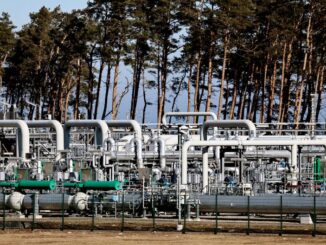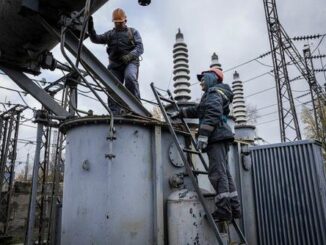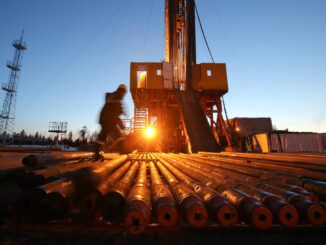
Today OPEC+ woke up and chose scorched-earth war against the Fed.
That’s because while the US central bank is already trapped, and is desperately looking for any excuse to halt its tightening campaign now that inflation is accelerating to the downside not just because regional banks desperately need a lower Fed Funds rate to short-circuit the relentless deposit drain which won’t stop (and will lead to even more bank failures and resolutions) until their deposit rates can at least match those of the Fed, but also because various liberal rags have already thrown Powell, pardon, the “Trump-era holdover” under the bus for the coming recession…
… OPEC’s shocking shot across the Fed and Biden bow revealed in its intention to keep oil prices high even as central banks push the world into a recession, just made life for the central planners very difficult, as the sordid stench of stagflation is suddenly all over the place.
But while much will be said about the monetary consequences of OPEC’s action, which may be viewed as sealing the fate of countless small banks in an act that any objective person would deem monetary warfare by the anti-Western alliance of China, Russia, and now Saudi Arabia, the complexity of which can be summarized as follows…
… there is a much simpler, if far more impactful geopolitical consequence of today’s post-OPEC news price surge.
Readers may recall that one of the reasons why oil first exploded a year ago, then drifted ever lower before hitting a 16 month low just two weeks ago, is because it only gradually became apparent that despite the bluster and posturing, most Western nations – with the exception of a few truly stupid ones – realized that they never intended to truly sanction Russian oil exports int he aftermath of the Ukraine invasion. Much to the chagrin of Zelensky, this meant that despite their dramatic, Oscar-worthy anti-Putin monologues, western leaders never actually intended to halt Russia’s commodity exporting machine as the consequences for the west would be far more dire.
That’s why when the Russian $60 export price cap was being debated a few months ago, the US quickly quashed any debate for lowering the cap even more as it would mean truly limiting how much oil Russia could export. You see, $60 was a perfect price: as long as Brent traded around $80, Russian Urals – which has traded with a 25-30% discount to Brent – would be comfortably below the cap and any and all Western countries that needed Russian oil could buy it, in the process explicitly funding the Russian military machine that they so vocally oppose by funneling money to the Kiev regime (knowing very well most of that money will be embezzled and will be never seen again).
But where things get problematic is if and when oil prices jump – like they did today – because a spike in Brent also means that Russian Urals will go right up with it. In fact, if Brent rises above $85 or so, Urals hits $60… and if it goes higher, it’s game over for the farce that has passed for Russian oil export sanctions.
Which brings us to today because as the chart below shows, Urals just hit $60 and any further increases in its price mean that virtually everyone in the anti-Russian west is suddenly cutoff from Putin’s oil.
What happens then? Will western nations follow sanction guidelines and stop buying Russian oil, which means sending the price of all non-Russian oil sharply higher (even as India and China step up and buy whatever western importers no longer desire), or will the anti-Russia alliance splinter?
While we are confident that many governments will do the former even if it means more hardship for their citizens, if only to signal their virtue and keep the US state department happy, some are already showing that the anti-Russian alliance isn’t worth the paper it is written on in carbon credits.
Japan is one such nation.
As the WSJ reports today, one of Washington’s closest allies in Asia is now buying oil at prices above the cap, in effect breaking with the sanctions regime imposed by US allies.
As the note adds, Japan got the U.S. to agree to the exception, saying it needed it to ensure access to Russian energy. The concession shows Japan’s reliance on Russia for fossil fuels, which analysts said contributed to a hesitancy in Tokyo to back Ukraine more fully in its war with Russia. It also shows why the price cap was imposed at a level where it doesn’t actually adversely impact Russian oil exports. But the current price surge means that unless the price cap is lifted, the U.S. alliance is about to shoot itself in the leg.
Going back to Japan, it’s the one country which – at a time when most European countries have at least claimed they are reducing their reliance on Russian energy supplies – has stepped up its purchases of Russian natural gas over the past year. Japan is the only Group of Seven nation not to supply lethal weapons to Ukraine, and Prime Minister Fumio Kishida was the last G-7 leader to visit Ukraine after Russia’s invasion.
In the first two months of this year, Japan bought about 748,000 barrels of Russian oil for a total of ?6.9 billion, according to official trade statistics. At the current exchange rate, that translates to $52 million, or just under $70 a barrel.
Of course, Japan will never admit that Russia has leverage over its energy needs, and there has been a diarrhea of hollow rhetoric in recent days seeking to dispell speculation the Japan’s New PM Fumio Kishida is Putin’s bitch:
Mr. Kishida has said the G-7 summit he is hosting this May in his hometown of Hiroshima will demonstrate solidarity with Ukraine. Tokyo has said it is committed to supporting Kyiv and can’t send weapons because of longstanding export restrictions the cabinet has imposed on itself.
“We absolutely will not allow Russia’s outrageous act, and we are imposing strict sanctions on Russia in order to stop Russia’s invasion as soon as possible,” said chief government spokesman Hirokazu Matsuno.
But empty rhetoric aside, the oil purchases which have been authorized by the U.S., represent a break in the unity of U.S.-led efforts to impose a global $60-a-barrel cap on purchases of Russian crude oil.
The cap works because oil-buying nations, even if they aren’t aligned with the U.S., generally need to use insurance and other services from companies based in the U.S. or one of its allies. The G-7, the European Union and Australia have agreed to rules forbidding those companies from furnishing services if a buyer of Russian oil is paying more than $60 a barrel.
The nations last year granted an exception to the cap through Sept. 30 for oil purchased by Japan from the Sakhalin-2 project in Russia’s Far East. An official of Japan’s Ministry of Economy, Trade and Industry said Tokyo wanted to ensure access to Sakhalin-2’s main product, natural gas, which is liquefied and shipped to Japan. “We have done this with an eye toward having a stable supply of energy for Japan,” the official said.
He said a small quantity of crude oil is extracted alongside the natural gas at Sakhalin-2 and needs to be sold to ensure liquefied natural gas, or LNG, production continues. “The price is decided by negotiations between the two parties,” he said. Russia accounts for nearly one-tenth of Japan’s natural-gas imports, most of it from Sakhalin-2, and the quantity bought by Japan last year was 4.6% greater than in the previous year.
That marks a contrast with Germany, which relied on Russia for 55% of its natural-gas imports before the war and survived a complete cutoff through a quick remodeling of its import infrastructure. Germany’s economy grew last year faster than Japan’s, bucking forecasts of a German recession triggered by the cutoff of Russian gas. Of course, instead of being as reliant on Russian gas, Germany is becoming far more reliant on US LNG shipments. How long until the undue reliance on US goodwill for a country that is one of China’s largest trading partners comes back to bite it?
“It’s not as if Japan can’t manage without this. They can. They simply don’t want to,” said James Brown, a professor at Temple University’s Japan campus. Prof. Brown, who studies Russia-Japan relations, said Japan should move to withdraw from the Sakhalin projects eventually “if they’re really serious about supporting Ukraine.”
Guess they are not “really serious about supporting Ukraine.”
But they are not alone: and once Urals rises above $60 for all nations that buy the cheap Russian grade, we are about to find out how many other nations are also not serious about supporting Ukraine, and will promptly exit the anti-Russian alliance if it means access to Russian oil at just over $60 or paying Riyadh $80, $90, or $100 (or more) for the exact same cargo.
Japan has almost no fossil fuel of its own and relies on imported natural gas and coal for much of its electricity. Officials have said it would be self-defeating to give up access to the Russian liquefied natural gas because Russia could turn around and sell the LNG to China.
In addition to the price cap, the U.S. and many of its allies have largely banned the import of Russian oil into their own countries.
While US officials had said for months that the cap has been generally successful in pushing down Russia’s oil revenue while stabilizing global oil markets, that is about to change thanks to the surprise OPEC+ (where Russia is a key member) production cut, one which will inevitably lift Urals price above $60, triggering sanctions for anyone who buys it.
Loading…



